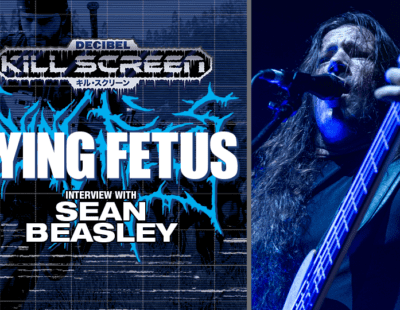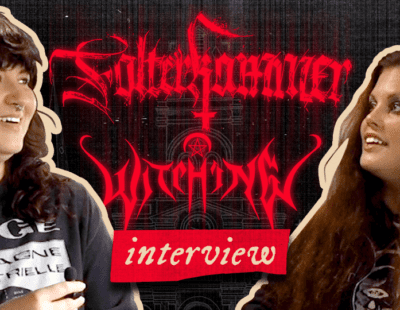
Amebix is obviously a name that holds a lot of meaning to quite a lot of people. One of the spearheads of the 1980’s anarcho-punk movement, they’re also one of the bands that laid the foundation for the mixture of punk and metal that has surged over the last decade. Then, upon reforming nearly a decade ago they released a shocking record that was both incredibly forward thinking and not what people expected. And like the wind, they were gone again.
A few years later, rumblings of vocalist/bassist Rob “The Baron” Miller’s return to music with members of Voivod, War//Plague and the criminally underrated Misery under the name Tau Cross began. And with their self-titled EP, they proved to be much more than the sum of their parts, a difficult feat for a band which contains the closest thing to royalty these subcultures have.
I have to be honest: it took me some time to get into Tau Cross’s debut. Looking back I don’t understand why, since it’s now in constant rotation for me but maybe some art needs to be combed over to peel back its secrets. Pillar of Fire, their newest offering, has a similar story in that it needs repeated listens to shed light on its many caves and crevasses but, unlike its predecessor, it caught me instantly and hasn’t let go. And while I’m sure the tag “supergroup” will stick since it’s an easy way for lazy minds to process things, it’s an entirely unfair way to categorize Tau Cross.
Miller explains: ”I don’t feel that any venture I am involved with is worthy of the title ‘supergroup,’ but I realize that it is a convenient way to explain that there are several people involved who have made their own way in life and music and have been recognized for that. Personally, I have never really felt any weight of expectation, and never been afraid to disappoint or enrage people who want you to stay on message. I have always followed my own star, I believe.”
Even with two records under their belt, there’s always going to be people out there who equate Tau Cross as a continuation of Amebix. Is this something that Miller thinks about?
“I think that was the initial reaction from a lot of people, particularly under the ‘supergroup’ moniker, but many people did not understand how traumatic the end of Amebix was, and the difficulties I had letting that go in order to step into the unknown again. Tau Cross was a leap of faith that happened only at a very particular time and has become the vehicle that i want to travel this road in.”
Tau Cross continues the legacy created by the bands each individual member is known for but, most importantly, Pillar of Fire is an adventurous record, which their prior recording hinted at, spanning genres like post-punk, metal and those moments in the late 60’s where some psych bands began to experiment with an almost-medieval style of folk.
“It was not a conscious development at all,” Miller states. “We all started writing songs and before we knew it, an album appeared from that. Jon and Andy both brought their own songs to the new album. It was a challenge for me to figure out how to make a vocal around some of this stuff just because it was written very differently to how i write, usually. We never tried to make something like something else or someone else.”
I bring up the inevitable comparison to Killing Joke, especially on this record more due to the adventurous nature of the music, and also that Rob’s vocals tend to remind me of Jaz Coleman, only not yelling about chemtrails and disappearing across the world before a tour. He disagrees.
“I cannot for the life of me see where the KJ comparisons come in. The guitar is nothing like KJ, the bass or drums, perhaps so phrasing but TC is much more of a Rock band i would say, with a capital R.”
It’s at this point, I realize that I have an opportunity to pick Rob’s brain about a lot more than just the record, which I’m sure will be covered by much more musically capable journalists than I, so I decide to switch to other topics. What about creative motivation? Miller has been involved in the arts in one form or another spanning across four decades. What keeps him creatively hungry?
His response: “I haven’t really been involved with music for some 20 years at one point but I have always been creative. It is not a thing you can extinguish, It will pop up in another area if you try to. As a musician, I do like having a vehicle to try and put forward an idea or two, to create a landscape and a personal sort of mythology. I am a very visual person, so I love to transmit ideas that way, through lyrical imagery. I love to capture the imagination.”
As someone who is observing simply through the lens of what’s been documented (which could be rose colored glasses), it seems that the scene Miller came up in were far more engaged intellectually and spiritually (not particularly in a religious sense). Is it disappointing to see the generations after that turn towards a celebration of apathy and plastic consumerism?
“Again, I am not so sure of that,” Miller says. “Maybe those rose-tinted glasses paint an ideal picture, but I don’t think there are ever more than a handful of people in any ‘scene’ who are actually thinking about things and articulating; most are happy to follow along for the party. I suppose we had to work a lot harder to get heard in an age before computers, make real contacts, travel and talk, be active.”
But has critical thinking and a curious approach to the world become lost or dying concepts? Miller disagrees: “I don’t think so. I meet a lot of younger people now who do articulate their own ideas very well. I think what is missing is the importance of dialogue and argument in the true sense, as a means to discover something new together, not as a war, philosophy in its original sense, a love and pursuit of wisdom”
When you look at the last few decades of history you see a pattern of a perceived worsening of society. Political leaders who rarely have the public’s best interests at heart, corporations who never do, and a complete idolatry of anti-intellectuals. After seeing so many years of the worst of man, does Miller see any reason for optimism?
He explains, “I don’t think now is much different to any time previously but there is a new factor involved inasmuch as we have the Internet and the discussion has become defined within that medium, more people are able to exchange ideas and information — some less reliable than others but this does give an edge to the masses against the established hierarchy. The downside, of course, is that we all feel too connected to events and dramas that in fact have very little to do with us or ‘real life.’ I am not sure about optimism. If we are alive and consider that a good thing, then maybe it is.”
But what is it that ties our past to our present when we look deeper into the dynamic and somewhat terrifying world around us? “Exploitation of the good people by the predominantly bad people;those with a conscience and a moral compass make allowances for others less sentimental, who are more interested in finding ways to make other people do the labor for them, whilst retaining control of the power, and the energy grid in each day and age. The prevailing condition is one of servitude and exploitation versus corruption and power; this is the human condition, a consequence of duality.”
He continues: “Generally people are afraid to not know, they prefer to cling on to one belief system regardless, and see it as somehow a weakness to be wrong. Without being wrong we simply cannot move and grow, we need to see both sides of this existence, and somehow try to synthesize our experience into something new; a distillation of all that is available to us. We have created a bogey man enemy as a means to keep control over the masses, financed and equipped this proxy terrorist threat and treat it as something tangible and real. It is manufactured terror, which has taken decades to fan into flames. What I cannot get my head around is that people mistake this phenomenon as being someone else’s creation, when in fact we are the terror.”
Maybe a boring question to some but one I was intensely curious about was what did Miller think three books that would complement the listening experience of Pillar of Fire be and why?
He states: “John Keel – The Eighth Tower. His ideas on vibrational interaction between unseen dimensions fascinates me. Jacques Vallee – Passport to Magonia. Again, an examination of the phenomena throughout the ages and an important work to cement the relationship between the demonic/faerie and U.F.O experience, and the exact parallels in every age. Alfred Lord Tennyson – Morte D’Arthur, an epic poem on the Arthurian Mythos that is full of rich landscapes and meaning, a perfect accompaniment.”
To close our lengthy conversation, I ask Rob how he would describe Tau Cross to someone who was unfamiliar with to the band. His brief but poignant answer is a perfect way to end our chat: “Music for the winter fires, storytelling and a doorway into the underworld.”
Pillar of Fire will be out on July 21 via Relapse Records.







